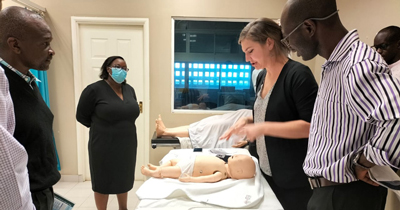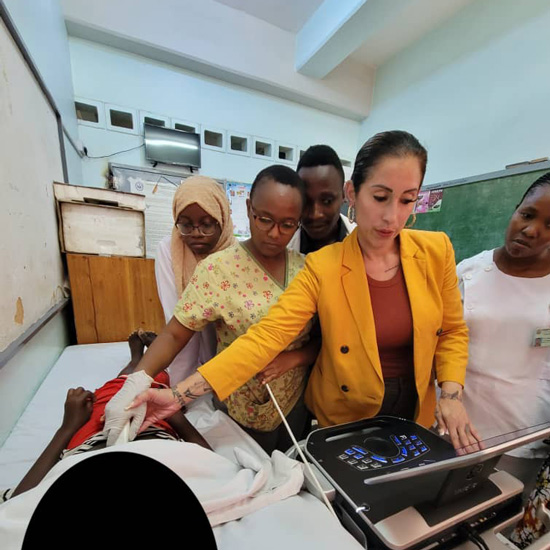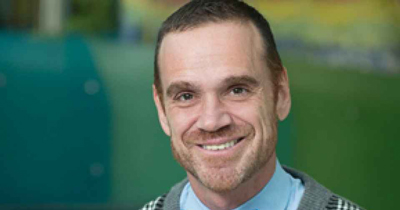Practice Makes Perfect: Pediatric Patient Simulation Delivers Better Health Outcomes in Kenya

While many institutions in the United States offer their students practical experience in global health education, programs remain overwhelmingly one-sided. When well-funded organizations send teams to provide clinical care, establish educational opportunities, and launch research projects with partners in limited-resource facilities without a bidirectional exchange component, these practitioners miss out on a crucial lesson in global health education: how to deliver equitable health outcomes.
That’s not the case at Northwestern.
The Robert J. Havey, MD Institute for Global Health at the Northwestern University Feinberg School of Medicine and Ann & Robert H. Lurie Children’s Hospital of Chicago have a mutual interest in developing truly equitable global health partnerships rooted in expanding knowledge and building capacity through transdisciplinary research and education. Their long-standing partnership with Bugando Medical Center in Mwanza, Tanzania, proves how bidirectional exchange provides a collaborative and reciprocal experience for both partners. These cross-disciplinary programs allow residents from each institution to travel to the other’s settings, where they learn from and teach each other, ensuring a truly equitable educational experience for all.
“Our ethos and approach to care is ‘how can we engage in a way that allows others to access Northwestern’s resources so they can take better care of their patients,’ rather than us taking care of their patients with our resources,” said Colleen Fant, MD, MPH, pediatric emergency medicine attending physician at Lurie Children's and assistant director of Global Health Simulation at the Robert J. Havey, MD Institute for Global Health. “That's a much more sustainable model.”
It's more sustainable in many respects, from allocating financial resources to helping partners build educational capacity. While other programs may focus more on patient care in the short term, this approach may unintentionally undermine local providers and could prevent their area’s health care system from evolving. Northwestern takes the view that it’s the global community that should benefit most from bidirectional exchange. This means the money, personnel, and hours spent are tailored to available resources to ensure the work delivers a long-term benefit. But it does take time.
“We’re quite lucky that we have over 15 years of bidirectional partnership,” Fant said. “I believe that's built trust and a spirit of real collaboration to discern how we can leverage our resources together. And now we have interest in how we make it more academic and how we can further build on it.”
When Bugando Medical Center residents and faculty said they wanted more exposure and experience in pediatric cardiology, Lurie teams made it happen. When in Chicago, students work for at least a week on pediatric cardiology rotations and learn from a cardiac ultrasonographer how to improve their abilities to perform cardiac ultrasounds on kids. Additionally, a former resident returned as a pediatric cardiologist and Bugando faculty member to observe and learn what procedures and methods are most adaptable.

“Our ethos and approach to care is ‘how can we engage in a way that allows others to access Northwestern’s resources so they can take better care of their patients,’ rather than us taking care of their patients with our resources.” Here, Jen Acevedo, an Echosonographer from Lurie Children's Hospital demonstrates a cardiac ultrasound to pediatric residents in Mwanza, Tanzania.
Without any cardiac surgeons and only one pediatric cardiologist in Tanzania, it’s a huge burden for a pediatrician to double as a cardiologist as required. That’s why this collaboration is crucial to teaching this advanced skill.
“There’s a large educational component with only one attending physician who could teach the skill. But she was also doing over 200 echocardiograms a month, which is a ton,” Fant said. “Another challenge we wanted to solve was addressing the fact that the residents didn't have access to additional advanced echo training either. And that’s where our collaboration kicked into high gear.”
Fant tapped a resident to develop a year-long curriculum, complete with online modules and virtual Q&A sessions with Northwestern cardiologists. The program culminated at Bugando with a week-long intensive echocardiogram training. The second session starts in September.
Each year, as many as 20 third-year pediatric residents travel to Tanzania to gain exposure to managing complex pediatric diseases in a low-resource setting. Another facet of the exchange is teaching a low-tech simulation curriculum, where Bugando students receive in-situ medical training. In exchange, Tanzanian residents come to Chicago for a month to receive research skills training and clinical exposure, as well as participate in educational conferences and take medical simulation sessions.
“While many institutions really focus on how to get their own trainees global health experiences, we’ve said from the get-go of this partnership that in order to be equitable, thoughtful and ethically driven, we had to make sure we had a bidirectional program,” Fant said. “Dynamic and equitable partnerships are the backbone of global health. I’m grateful that Northwestern really provides a whole spectrum of support for our program.”
Colleen Fant, MD, MPH is a member of Robert J. Havey, MD Institute for Global Health and Northwestern University Clinical and Translational Sciences Institute (NUCATS).

